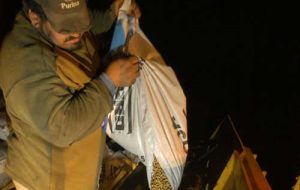MercoPress. South Atlantic News Agency
Soybean area keeps expanding in Uruguay; rice planters turning to the oilseed

Uruguayan farmers are planning to sow 1.105.000 hectares of crops this coming 2012/13 summer season, which is similar to last year’s of which 890.000 hectares or 80% will be dedicated to soybeans.
According to the Ministry of Agriculture and Livestock Stats Office (DIEA), the winter crops’ survey showed that a total of 587.000 hectares were planted, which represents a 20% drop from the previous season.
Wheat was the grain which lost most hectares (156.000) compared to the previous season and which was partly compensated by barley and oats, according to the DIEA survey. The area covered with wheat reached 437.700 hectares; barley, 112.000; oats-grain 23.600 and rapeseed 13.200 hectares.
Regarding another summer crop, rice, the lack of sufficient water in reservoirs and little prospects of sufficient rainfall could lead to a significant drop in the area planted: almost 40.000 out of a total 180,000 hectares.
“Water in the dams on average is only at 50% of its capacity, and this is particularly evident to the east of the country where the deficit is even larger”, said Hernan Zorrilla, Vice-president of the rice planters, ACA.
Zorrilla said that with this supply of water the area planted with rice could drop 40.000 hectares from the original 180.000 hectares estimated at the end of the last crop. Sowing has already started in the north of Uruguay and should continue as of mid-October in the east of the country.
Romulo Gamarra a member of ACA said that even with abundant rains in the near future, things won’t improve because they will hamper the sowing season. Any rice planted after mid October will necessarily have lower yields.
“Therefore farmers will be looking for seeds with a shorter maturing cycle, but that affects the whole equation. Those areas which normally have the highest yields will be planted but the marginal ones will suffer”, said Gamarra who added that the issue now is “how much has been lost”
According to ACA rice planting costs have soared in the recent seasons and last year reached a peak leaving many farmers with red numbers.
Gamarra also revealed that given the higher costs some rice farmers are now turning their fields to soybeans given the higher profitability. “This has also influenced in the lower rice area estimated for this season”.





Top Comments
Disclaimer & comment rules-

Read all commentsGood for Uruguay's place in the world though right?
Sep 28th, 2012 - 12:21 pm 0Commenting for this story is now closed.
If you have a Facebook account, become a fan and comment on our Facebook Page!